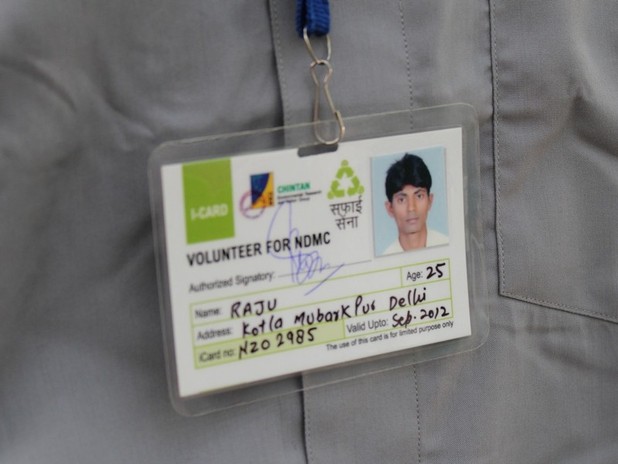November 02, 2011
IDEO.org Fellow Sarah Lidgus and the Rockefeller team meet with waste pickers in Delhi, a group of particular interest to the team because waste pickers are informal workers, unregistered and unmonitored by any form of government.
If cities are places filled with extremes on all levels -- culture and commerce, people and politics, traffic and trash - Delhi is a place overflowing. It is a massively populated city with an increasing appetite for consumption, and garbage has become a visible byproduct of its growth. And without the governmental infrastructure in place to make it all cleanly disappear, the waste piles up.
But the poorest of the poor in India have found a living in what others discard. Just as collecting and recycling cans can become a livelihood in the U.S., India’s waste pickers sort through trash bins and landfills to find plastics, glass, and other materials that can be sold to scrap dealers and upcycled back into the system.
There are an estimated 1.5 million waste pickers — men, women, and children - working every day in India. They are almost always from migrant families, grow up without proper education, and are almost always living on the street or in slums. Their work has historically been looked down upon by the public and they have generally been ignored by the government. Waste pickers are often subjected to harsh treatment from the police, who see them as stealing the property of others. With the help of local organizations and a growing collective movement amongst themselves, waste pickers are finding their collective voice and starting to fight back.
One organization that’s working with the waste pickers in Delhi is Chintan Environmental Research and Action Group. While Chintan’s mission is rooted in environmentalism and the greening of urban spaces, the organization has had a profound effect on the city’s waste pickers. The organization has created a registration program for waste pickers that both lends them legitimacy to the outside world and connects these individuals working citywide to one another. Chintan has long recognized the important role waste pickers have played as part of Delhi’s waste management infrastructure, and has worked alongside waste pickers to increase their visibility within, and expose their value to society. Uniforms and ID badges have contributed immensely to the cause, helping make waste pickers legitimate in the eyes of Delhi’s residents.
A few days ago Patrice (Patrice Martin, Co-Lead of IDEO.org) and I had the pleasure of meeting Chintan’s founder, Bharati Chaturvedi, to talk about her work and the role of Chintan in the community. Mostly, she said, she’s interested in answering the question, “How can the planet and the poor jointly get a future?” We met with Mukesh, Ravi, and Raju, three waste pickers who work door-to-door, and asked them about their present and their future. They told us about how much they appreciated their jobs, and how the job has gotten better now that they’ve been recognized as legitimate workers.
In many ways, India’s waste pickers are the epitome of a modern green workforce, and should be seen as a source of inspiration - not just in Delhi, but worldwide. As Bharati said, “It’s about becoming visible, but becoming visible in a certain way. It’s about becoming visible with the times.”





